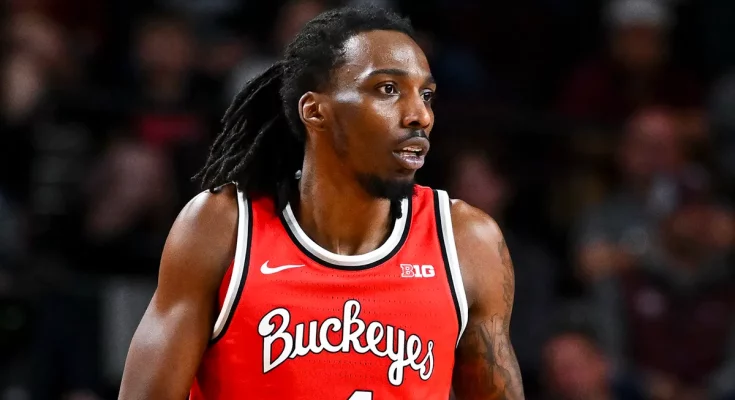Jeremiah Smith, one of the most electric young voices in college football, has ignited a fresh wave of energy and passion among fans by delivering a statement that resonates with every fiber of what makes college football rivalries so legendary. In an era when some claim that traditional rivalries have lost their meaning due to conference realignments, expanded playoffs, and shifting player priorities, Smith has defiantly set the record straight. With raw conviction, he declared, “The Game still has significance,” emphasizing that no matter how much college football evolves, the heart and soul of its most historic rivalries remain untouchable. His bold words, “A rivalry is a rivalry — they don’t like us, we don’t like them,” have already etched themselves into the annals of motivational sports talk, firing up fans on both sides of the rivalry and beyond. For Smith, this isn’t just talk — it’s a creed, a reminder of why players suit up every season, why fans pack stadiums and paint their faces, and why, at the end of the day, there’s something sacred about facing your greatest foe.
Smith’s impassioned stance comes at a time when debates over the value of rivalries have become more pronounced. The commercialization of the sport, with NIL deals and transfer portals shaping player decisions, has made some wonder whether rivalries like the one he referenced can maintain the same level of emotional intensity. Yet, Smith believes such concerns are misguided, even laughable. “Anyone who thinks otherwise is crazy,” he said, a statement that might seem confrontational but is rooted in a deep understanding of what these matchups mean to players, alumni, and fanbases. To him, this isn’t just about one game on the schedule — it’s about identity, history, and the emotional stakes that have defined generations of competition. When a player like Smith, known for his competitive spirit and ability to inspire, steps forward to defend the integrity of a rivalry, it becomes clear that these games are far more than wins and losses. They’re about pride, bragging rights, and the legacy of a program.
The particular rivalry Smith referenced, known simply as “The Game,” is one of the most storied in all of sports. Over the decades, it has transcended the field to become a cultural event, a clash of philosophies and traditions as much as athletic prowess. Every meeting between the two powerhouses feels like a war, with months of anticipation and years of historical moments feeding into the intensity of each snap. To diminish its importance, as some have suggested in light of recent playoff expansions and scheduling changes, is to misunderstand the very heartbeat of college football. Smith’s reminder serves as a rallying cry: these rivalries are the lifeblood of the sport, and to treat them as anything less is to rob the game of its soul.
Fans have responded to Smith’s comments with overwhelming support, flooding social media with affirmations of his statement. Hashtags like #TheGameMatters and #RivalryIsForever have trended across platforms, showcasing just how deeply these sentiments resonate with the public. For many, Smith’s words capture what they’ve always felt but perhaps couldn’t articulate as powerfully. Rivalries aren’t just about who’s better on any given Saturday; they’re about generations of family members rooting for opposite sides, about the stories passed down of legendary games, about the tears of both joy and heartbreak. When Smith says, “They don’t like us, we don’t like them,” he’s not merely talking trash — he’s tapping into a shared emotional experience that unites fans across eras.
To fully appreciate why Smith’s comments carry so much weight, one must understand his own competitive background. Known for his fiery demeanor and relentless work ethic, Smith has always approached the game with an old-school mentality. For him, rivalries aren’t something you fake or treat lightly; they’re personal. Growing up, he witnessed the magic of rivalry weekends — the divided households, the friendly (and sometimes not-so-friendly) banter, and the way everything seemed to stop when those two teams took the field. It’s that memory and understanding that fuel his perspective today. When he speaks on rivalries, it’s from a place of genuine respect for what they represent, both to him as a player and to the countless fans who live and breathe these matchups.
This authenticity is perhaps why his comments have struck such a chord. In an age where athletes are often criticized for being overly polished or giving bland, media-trained responses, Smith stands out as someone who isn’t afraid to speak from the heart. His declaration that “anyone who thinks otherwise is crazy” may have ruffled some feathers, but it also highlights his unwillingness to sugarcoat the truth. He knows that rivalries are emotional, and he’s not interested in pretending otherwise. For Smith, the tension, the animosity, and the raw energy between rival teams are what make college football unlike any other sport.
Historically, rivalries like “The Game” have produced some of the most unforgettable moments in sports history. From last-second touchdowns to shocking upsets, these clashes are often defined by drama and unpredictability. They’re games where legends are made, where a single play can cement a player’s place in the history books. Smith understands this better than most, which is why he’s so adamant about defending the significance of these contests. In his mind, to downplay a rivalry is to downplay the very essence of competition. It’s about more than trophies or rankings; it’s about proving yourself against your greatest adversary, about carrying the weight of your program’s history on your shoulders, and about leaving it all on the field for something bigger than yourself.
The cultural impact of rivalries cannot be overstated. They unite communities, bring families together (even when they’re cheering for opposite sides), and provide a sense of tradition in a world that’s constantly changing. For alumni, these games are annual reminders of their college days, of the camaraderie and passion that defined their time on campus. For current students, they’re an opportunity to create memories that will last a lifetime. And for players, they’re a chance to etch their names into the annals of history. Smith’s statement is a nod to all of this — a recognition that these rivalries are woven into the very fabric of college sports.
In recent years, there’s been a growing narrative that the expansion of the College Football Playoff and the shift toward super conferences have diminished the importance of regular-season games. Some argue that with more teams having a shot at the postseason, individual rivalries don’t carry the same weight they once did. But Smith’s comments challenge this idea head-on. He believes that rivalries are immune to such changes because they’re not just about postseason implications — they’re about pride and history. Whether or not a playoff berth is on the line, beating your rival is always a season-defining accomplishment.
The timing of Smith’s statement couldn’t be more perfect. As the season approaches, fans are already buzzing with anticipation, and his words have only added fuel to the fire. Rivalry games are circled on calendars months in advance, and for players like Smith, they represent the pinnacle of competition. By speaking out now, he’s not only setting the tone for his team but also reminding everyone of what’s at stake. It’s not just another game — it’s the game, the one that will be talked about for years to come, the one that will define how fans remember the season.
Smith’s comments also highlight an important aspect of sports psychology. Rivalries have a unique ability to bring out the best in players. The heightened emotions, the extra motivation, and the pressure to perform all combine to create an environment where greatness often emerges. When a player steps onto the field against a rival, they know that every mistake will be magnified, every big play will be remembered, and every ounce of effort will be scrutinized. For competitors like Smith, this is exactly what makes the experience so special. It’s a test of character, skill, and mental toughness, and the rewards — both tangible and intangible — are immense.
The reaction from the opposing fanbase has been predictably intense. Rivalries thrive on a sense of us-versus-them, and Smith’s words have only deepened that divide. Social media has been flooded with responses from rival fans, some mocking his confidence, others acknowledging the truth in his statement. But whether they love him or hate him, everyone is talking about him — and by extension, about the upcoming clash. This is the power of rivalries: they generate conversation, controversy, and excitement like nothing else in sports.
Beyond the immediate buzz, Smith’s comments raise important questions about the future of college football. As the landscape continues to evolve, will traditional rivalries hold the same place in the sport’s hierarchy? For Smith, the answer is an unequivocal yes. He believes that as long as players and fans care deeply, as long as the history and emotion remain intact, rivalries will continue to thrive. His statement serves as a challenge to anyone who would dare suggest otherwise: don’t underestimate the power of tradition, or the passion that fuels these games.
If anything, Smith’s words might serve as a rallying cry not just for his own team, but for all of college football. In a time when the sport is undergoing significant changes, from conference realignments to NIL deals, there’s something comforting about the idea that some things never change. Rivalries, with all their pageantry and emotion, are one of those constants. They remind us why we fell in love with the sport in the first place, why we tune in every Saturday, and why these games matter so much.
Smith’s role as both a player and a spokesperson for the culture of college football cannot be understated. His willingness to speak passionately about the things that matter — not just statistics or rankings, but the intangible elements that give the sport its soul — sets him apart. When he says, “The Game still has significance,” it’s not just a statement about one particular matchup; it’s a declaration about the state of college football as a whole. It’s a reminder that at its core, this sport is about competition, emotion, and tradition, and those things can’t be bought or manufactured. They’re earned, cultivated over decades of fierce battles and unforgettable moments.
The next chapter of “The Game” is already shaping up to be one for the ages, thanks in large part to the fire Smith has lit with his comments. Fans on both sides are more invested than ever, eager to see how this narrative unfolds. Will his words inspire his team to rise to the occasion? Will they motivate the opposition to prove him wrong? That’s the beauty of rivalries — they’re unpredictable, dramatic, and endlessly fascinating. What’s certain is that when the two teams take the field, there will be no lack of intensity, and every play will carry the weight of history.



